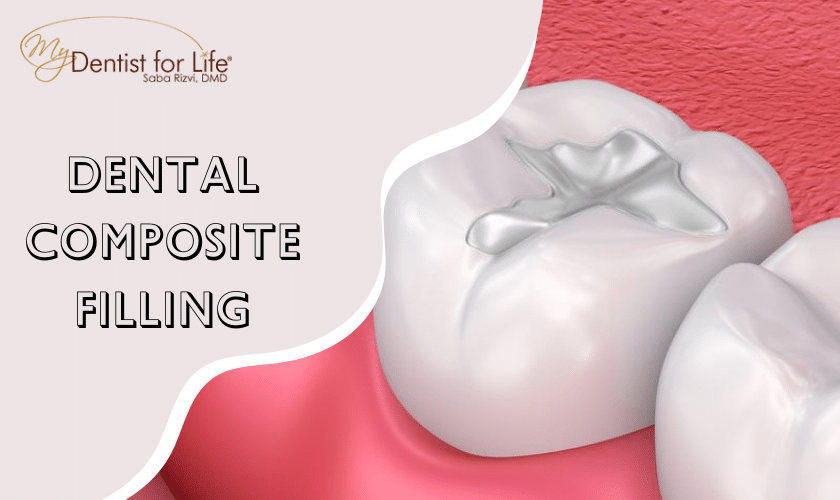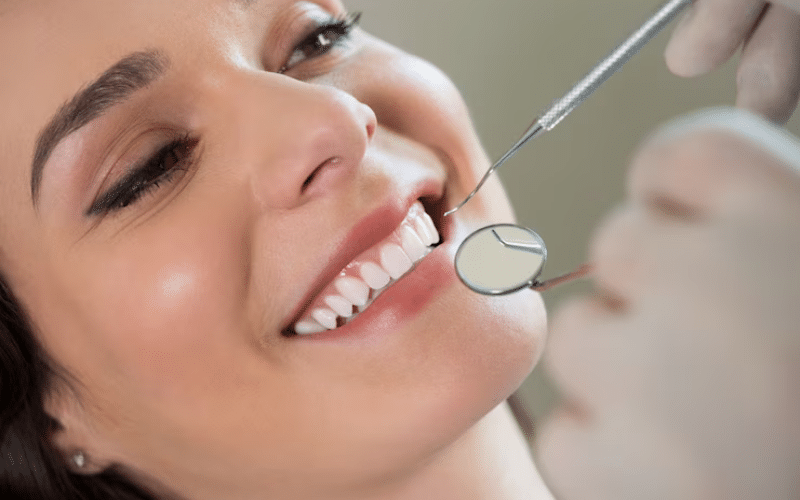ONLINE SCHEDULING AND VIRTUAL CONSULTS AVAILABLE

5 Common Mistakes To Avoid After A Dental Composite Filling

If you’ve recently gotten a dental composite filling, congratulations on taking care of your oral health! However, the journey doesn’t end there. To ensure that your filling lasts for as long as possible, it’s crucial to avoid certain mistakes that can damage or even dislodge it. In this blog post, we’ll discuss the five most common mistakes people make after getting a dental composite filling and how you can prevent them with some simple tips and tricks. So let’s dive in and learn how to take care of those pearly whites.
Eating Or Drinking Too Soon After The Procedure
After getting a dental composite filling, it’s important to avoid eating or drinking too soon after the procedure. This can be difficult for some people, especially if they’re used to snacking frequently throughout the day.
However, consuming food or drinks too soon after a filling can cause damage to the restoration and even lead to infection. The first 24 hours following your procedure are critical for allowing the filling material to fully bond with your tooth.
It’s best to stick with soft foods like yogurt, soup, and smoothies during this time. Avoid anything that is crunchy or requires excessive chewing as it could cause discomfort or irritation.
Additionally, drinking hot beverages like coffee or tea should also be avoided as they can compromise the integrity of the filling material. Instead, opt for cool water or other non-acidic drinks.
Taking care of your new dental composite filling involves being mindful of what you eat and drink in those crucial first few days after treatment. By doing so, you’ll help ensure that your restoration stays strong and lasts for years to come.
Chewing On Hard Foods Or Objects
After getting a dental composite filling, it’s important to be cautious with the foods and objects you put in your mouth. One of the most common mistakes people make is chewing on hard foods or objects.
When you chew on something hard, like ice or candy, you run the risk of cracking or damaging your filling. This can cause discomfort and may require additional dental work to fix.
Additionally, biting down too hard on pens or pencils can also damage your fillings over time. It’s important to avoid using your teeth as tools for opening packages or biting into non-food items.
To protect your dental composite filling, try sticking to softer foods for a few days after the procedure. Cut food into smaller pieces if necessary and chew slowly and carefully.
If you have any concerns about what types of foods are safe to eat after getting a filling, don’t hesitate to ask your dentist for advice. They can provide specific recommendations based on the location and size of your filling.
Remember that taking care of your dental fillings is essential for maintaining good oral health in the long term. By avoiding hard foods and being mindful of how you use your teeth, you’ll be able to keep them healthy and strong for years to come.
Not Caring For The Teeth Properly
One of the most common mistakes people make after getting a dental composite filling is not caring for their teeth properly. It’s easy to forget about taking care of your teeth when you’re busy with work or other activities, but it’s important to remember that neglecting your oral health can lead to serious problems.
One mistake people often make is brushing their teeth too hard. While brushing is essential for removing plaque and keeping your mouth clean, aggressive brushing can damage the filling and cause sensitivity or pain. Make sure to use gentle circular motions with a soft-bristled toothbrush.
Another mistake people make is skipping flossing altogether. Flossing helps remove food particles from between the teeth and prevents bacteria buildup, which can lead to decay around the filling. Be sure to floss at least once a day, being careful not to pull on the filling when maneuvering the floss.
Using over-the-counter whitening products without consulting your dentist can also harm your dental composite filling. Some whitening agents contain harsh chemicals that may erode both natural enamel and fillings causing them irreparable damage.
Avoiding regular checkups with your dentist could leave you unaware of potential issues affecting your filled tooth such as new cavities in neighboring areas due to lack of proper hygiene practice or some underlying gum diseases affecting supporting tissues holding onto this tooth tightly
Taking care of a dental composite filling does require extra diligence; however, ensuring good oral hygiene habits will keep these restorations healthy for years.
Not Wearing A Mouth Guard
When it comes to protecting your dental composite filling, one of the most important things you can do is wear a mouth guard. A mouth guard is a protective device that fits over your teeth and helps absorb shock from impact.
Many people think that mouthguards are only necessary for contact sports like football or hockey. However, even non-contact activities like basketball or skateboarding can pose a risk for dental injuries.
If you grind your teeth at night, wearing a mouth guard can also help protect your composite filling from damage caused by excessive force. Grinding can cause cracks or chips in the filling material which may require repair or replacement.
Not wearing a mouthguard could lead to unnecessary damage and additional expenses down the road. It’s important to invest in a high-quality custom-fitted mouth guard from your dentist to ensure maximum protection for both your natural teeth and any fillings.
Remember, prevention is always better than cure when it comes to maintaining good oral health.
Ignoring Sensitivity And Pain
Ignoring sensitivity and pain is a common mistake that people make after getting a dental composite filling. It’s important to understand that it’s normal to experience some sensitivity or discomfort after the procedure, but if it persists for more than a few days, you should seek professional help.
One of the reasons why people tend to ignore sensitivity and pain is because they don’t want to go back to the dentist. However, this can lead to further complications such as tooth decay or infection, which could require more extensive treatment in the future.
Another reason why people ignore sensitivity and pain is because they think it’s just a temporary inconvenience. However, if left untreated, it could develop into something more serious like an abscess or gum disease.
In some cases, sensitivity and pain may be caused by something as simple as pressure from biting down on hard food or grinding teeth at night. Your dentist can provide solutions such as custom mouthguards that will protect your teeth from further damage.
Don’t make the mistake of ignoring any discomfort following your dental composite filling procedure. Ignoring symptoms could lead to more serious issues down the line. Always consult with your dentist if you have any concerns about your oral health post-procedure.
How To Care For Your Dental Composite Filling
After getting a dental composite filling, it’s important to take care of it properly to ensure its longevity and effectiveness. Here are some tips on how to care for your dental composite filling.
Firstly, brush your teeth at least twice a day with fluoride toothpaste. Make sure you use a soft-bristled toothbrush and be gentle when brushing around the filled area. Flossing daily is also essential in removing any food particles or debris that may accumulate around the filling.
Avoid eating hard or sticky foods that could potentially damage the filling. This includes chewing ice, biting down on pens or pencils, and consuming excessive amounts of sugary treats. Instead, opt for healthy snacks like fruits and vegetables.
If you grind your teeth at night, consider wearing a mouthguard while sleeping to protect both your natural teeth and the composite filling from wear and tear.
Schedule regular check-ups with your dentist every six months so they can monitor the condition of your fillings and identify any potential issues before they become bigger problems.
By following these simple steps, you can help maintain the health of your dental composite fillings for years to come.
Getting a dental composite filling is an important step in maintaining good oral health. However, it’s equally important to take care of the filling once it’s been put in place. By avoiding common mistakes like eating or drinking too soon after the procedure, chewing on hard objects, and not caring for your teeth properly, you can ensure that your dental composite filling lasts as long as possible. Remember to wear a mouth guard if necessary and pay attention to any sensitivity or pain you may experience. With proper care, your dental composite filling can provide many years of trouble-free use.




